UCI moves to ban Tramadol in-competition use and introduces revised rules for low cortisol
Governing body will prevent riders from competing if they show low levels of cortisol
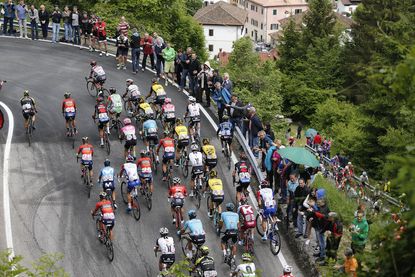
The peloton at the Giro d'Italia (Sunada)

The UCI has announced that it will ban the use of the analgesic Tramadol from in-competition use from 2019.
Pain-killer Tramadol has been was shown as recently as last week in a World Anti-Doping Agency report to be widely used among professional road riders, with numerous cases of anecdotal evidence over recent years of riders using the drug during races.
Due to it's possible side-effects of "dizziness, loss of alertness, drowsiness, or physical dependency and risks of addiction to opioids" as outlined by the the UCI, Tramadol will be banned from use in races from 2019 onwards.
The UCI Management Committee announced the ruling along with a whole host of other changes in a press release on Thursday evening.
The governing body will also impose a mandatory eight-day withdrawal from work and competition for riders using local infiltrations of glucocorticoids (a class of corticosteroids). For example, if a rider needed an injection to prevent inflammation in a knee joint, their doctor would be required to declare it and impose a minimum of eight-days away from work and competition.
The UCI said in its release that "glucocorticoids can trigger undesirable side-effects which, in the case of an accident or medical emergency, can be life threatening. For cyclists, we must consider that the potential consequences of corticosteroids are a medical contraindication for practising sport in competition."
Likewise, the UCI will consult "international experts" to decide which tests need to be carried out on riders before races to detect 'adrenal insufficiency', i.e. low cortisol levels.
Get The Leadout Newsletter
The latest race content, interviews, features, reviews and expert buying guides, direct to your inbox!
Previously, only voluntary members of the Movement for Credible Cycling (MPCC) have imposed a stint on the sidelines for riders with low cortisol levels - in which the adrenal glands do not produce sufficient amounts of steroid hormones like cortisol.
Use of corticosteroids for conditions like asthma can lead to low cortisol levels (as can illness or disease), which the UCI now says would be a "medical contraindication for competition" and "would therefore mean it is impossible to start the race."
In 2015, George Bennett was pulled from the LottoNL-Jumbo line-up shortly before the start of the Giro d'Italia that year for testing low in cortisol. Astana, like the Dutch team, are members of the MPCC but chose to go against the voluntary rules of the organisation after starting Lars Boom in the 2015 Tour de France, despite the rider showing low cortisol levels.
Astana said the low levels were "due to long-standing and well-known application of anti-asthma therapy by the rider" who went on to ride the Tour.
Corticosteroids have made headlines in recent years due to the Fancy Bears hacks which revealed 2012 Tour de France winner Bradley Wiggins had received a therapeutic use exemption for Triamcinolone, which was said to be used to treat allergies and asthma.
The UCI says its revised rules on Tramadol and glucocorticoids will be put in place from January 1, 2019.

Thank you for reading 20 articles this month* Join now for unlimited access
Enjoy your first month for just £1 / $1 / €1
*Read 5 free articles per month without a subscription

Join now for unlimited access
Try first month for just £1 / $1 / €1
Follow on Twitter: @richwindy
Richard is digital editor of Cycling Weekly. Joining the team in 2013, Richard became editor of the website in 2014 and coordinates site content and strategy, leading the news team in coverage of the world's biggest races and working with the tech editor to deliver comprehensive buying guides, reviews, and the latest product news.
An occasional racer, Richard spends most of his time preparing for long-distance touring rides these days, or getting out to the Surrey Hills on the weekend on his Specialized Tarmac SL6 (with an obligatory pub stop of course).
-
 Tweets of the week: Pogačar can be beaten, Pidcock meets the royals, and Remco's an Arsenal fan
Tweets of the week: Pogačar can be beaten, Pidcock meets the royals, and Remco's an Arsenal fanSadly for Tadej Pogačar, serial winning doesn't seem to apply to go karting
By Tom Davidson Published
-
 Friday roundup: Rapha does sportswear, Oakley meets PNS and Restrap makes a vest
Friday roundup: Rapha does sportswear, Oakley meets PNS and Restrap makes a vestTwo new clothing lines, some hi-tech smart glasses and a hydration vest to inspire you to ride further
By Luke Friend Published
-
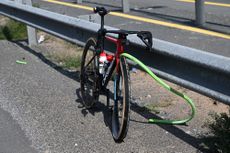 UCI to review hookless rims ‘as a matter of urgency’
UCI to review hookless rims ‘as a matter of urgency’Review follows Thomas De Gendt’s heavy crash at men’s UAE Tour
By Tom Thewlis Published
-
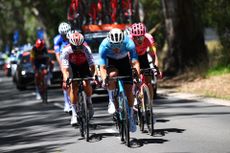 French WorldTour pro cyclist suspended for anti-doping ‘abnormalities’
French WorldTour pro cyclist suspended for anti-doping ‘abnormalities’Franck Bonnamour's biological passport is under investigation by the UCI
By Tom Davidson Published
-
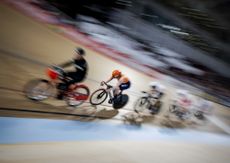 UCI rules new track cycling series a ‘forbidden event’ and threatens to fine riders
UCI rules new track cycling series a ‘forbidden event’ and threatens to fine ridersRiders are at risk of fines and suspension if they compete in the planned DerbyWheel
By Tom Davidson Published
-
 A $2,250 fine for wearing the wrong socks? UCI toughens sanctions for 2024
A $2,250 fine for wearing the wrong socks? UCI toughens sanctions for 2024Offences for non-compliant clothing and unauthorised feeding set to carry harsher fines
By Tom Davidson Published
-
 UCI hails 20% emissions reduction as it lays out sustainability plan
UCI hails 20% emissions reduction as it lays out sustainability planReport is part of world governing body’s commitment to reduce impact of its operations on environment
By Tom Thewlis Published
-
 ‘Unprecedented’ television audiences revealed for cycling Super Worlds
‘Unprecedented’ television audiences revealed for cycling Super WorldsFans around the world watched more than 200 million hours in August
By Tom Davidson Published
-
 Number of British women’s Continental teams set to double in 2024
Number of British women’s Continental teams set to double in 2024Three British teams have applied to step up to UCI level next season
By Tom Davidson Published
-
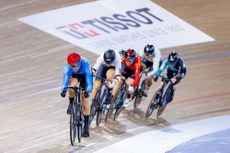 UCI warns UK that banning Russians will hurt chances of hosting future events
UCI warns UK that banning Russians will hurt chances of hosting future eventsUCI president David Lappartient reportedly says UK government does not trust the UCI will ensure Russian and Belarusian athletes will compete as neutrals in Scotland next month
By Tom Thewlis Published